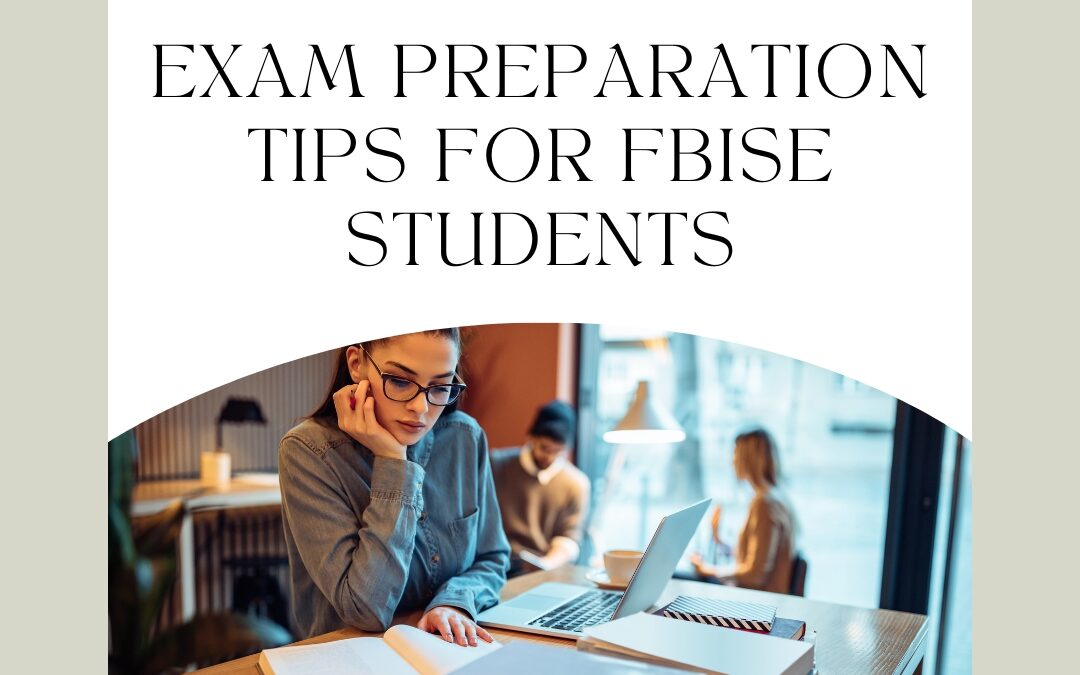Preparing for exams conducted by the Federal Board of Intermediate and Secondary Education (FBISE) can be a daunting task for students. The key to success lies in effective study strategies, time management, and maintaining a positive mindset. This article provides comprehensive tips and techniques to help FBISE students excel in their Intermediate and Secondary Education exams.
Understanding the Exam Format (FBISE)
Before diving into preparation, it’s essential to understand the exam format. FBISE exams typically include multiple-choice questions (MCQs), short-answer questions (SAQs), and long-answer questions (LAQs). Familiarizing yourself with the exam pattern can help you allocate your study time efficiently and focus on areas that carry more weight.
Creating a Study Plan

A well-structured study plan is crucial for effective exam preparation. Here are steps to create a robust study plan:
- Assess Your Syllabus: Break down your syllabus into manageable sections. Identify the chapters and topics that require more attention based on their weightage and difficulty level.
- Set Realistic Goals: Set daily, weekly, and monthly goals. Ensure these goals are achievable and specific. For example, aim to complete a particular chapter within a week.
- Prioritize Subjects and Topics: Allocate more time to subjects and topics you find challenging. Balance your study schedule to ensure all subjects receive adequate attention.
- Include Breaks: Schedule short breaks between study sessions to avoid burnout. The Pomodoro Technique, which involves 25 minutes of focused study followed by a 5-minute break, can be effective.
- Revise Regularly: Regular revision helps reinforce your memory. Dedicate the last few weeks before exams solely to revision and practice tests.
Effective Study Techniques
Employing the right study techniques can significantly enhance your learning experience. Here are some proven methods:
- Active Learning: Engage actively with the material by summarizing information, teaching it to someone else, or discussing it in study groups.
- Mind Mapping: Create mind maps to visually organize information. This technique is particularly useful for subjects like Biology and History.
- Flashcards: Use flashcards for quick revision of key concepts, formulas, and definitions. Digital flashcards like Anki can also be helpful.
- Practice Past Papers: Solve previous years’ question papers to understand the exam pattern and improve your time management skills.
- Mnemonics: Develop mnemonics to remember complex information. For example, use acronyms or rhymes to memorize lists and sequences.
Time Management
Time management is critical during both preparation and the actual exam. Here are some tips to manage your time effectively:
- Create a Timetable: Stick to a daily timetable that includes specific time slots for studying, breaks, and leisure activities.
- Avoid Procrastination: Tackle the most challenging subjects and topics first when your mind is fresh.
- Use Timers: Use timers to keep track of your study sessions and breaks. This ensures you stay on schedule and maintain a steady pace.
- Set Deadlines: Set deadlines for completing each chapter or topic. This helps in maintaining a sense of urgency and accountability.
Staying Healthy
Your physical and mental health significantly impact your exam performance. Here are ways to stay healthy during exam preparation:
- Balanced Diet: Eat a balanced diet rich in fruits, vegetables, proteins, and whole grains. Avoid excessive caffeine and junk food.
- Regular Exercise: Engage in regular physical activities like walking, jogging, or yoga. Exercise helps reduce stress and improve concentration.
- Adequate Sleep: Ensure you get 7-8 hours of sleep every night. Adequate rest is essential for memory consolidation and cognitive function.
- Hydration: Drink plenty of water throughout the day to stay hydrated. Dehydration can lead to fatigue and decreased concentration.
Dealing with Stress
Exam stress is a common issue among students. Here are some strategies to manage stress effectively:
- Relaxation Techniques: Practice relaxation techniques like deep breathing, meditation, and progressive muscle relaxation to calm your mind.
- Positive Thinking: Maintain a positive attitude towards your exams. Visualize your success and focus on your strengths.
- Talk to Someone: If you’re feeling overwhelmed, talk to a friend, family member, or counselor. Sharing your concerns can help reduce stress.
- Avoid Comparison: Don’t compare yourself with others. Everyone has their unique strengths and weaknesses.
Utilizing Available Resources

Leverage available resources to enhance your exam preparation. Here are some useful resources:
- Textbooks and Guides: Use the recommended textbooks and study guides provided by FBISE. They cover the entire syllabus comprehensively.
- Online Resources: Utilize online platforms like Khan Academy, Coursera, and YouTube for additional explanations and tutorials.
- Study Groups: Join or form study groups with classmates. Group studies can provide different perspectives and clarify doubts.
- Tutors and Coaching Centers: If needed, seek help from tutors or coaching centers specializing in FBISE exams.
Exam Day Strategies
Your performance on exam day is crucial. Here are some tips to ensure you perform your best:
- Arrive Early: Reach the exam center at least 30 minutes before the scheduled time to avoid any last-minute rush.
- Read Instructions Carefully: Take a few minutes to read the exam instructions and question paper thoroughly before starting.
- Time Allocation: Allocate time for each section of the exam based on the marks they carry. Ensure you have enough time to review your answers.
- Stay Calm: If you encounter a difficult question, stay calm and move on to the next one. You can return to it later.
- Review Your Answers: If time permits, review your answers to check for any mistakes or incomplete responses.
Post-Exam Reflection
After the exams, take time to reflect on your preparation and performance. Here are steps for a productive post-exam reflection:
- Analyze Your Performance: Identify the areas where you did well and those that need improvement.
- Learn from Mistakes: Understand the mistakes you made and how you can avoid them in the future.
- Seek Feedback: If possible, seek feedback from teachers or peers to gain insights into your performance.
- Plan for the Future: Use your experience to plan better for future exams. Adjust your study techniques and strategies accordingly.
Conclusion
Preparing for FBISE exams requires a combination of effective study techniques, time management, and a healthy lifestyle. By understanding the exam format, creating a structured study plan, utilizing available resources, and maintaining a positive mindset, students can enhance their chances of success. Remember, consistent effort and a balanced approach are key to excelling in your Intermediate and Secondary Education exams. Good luck


